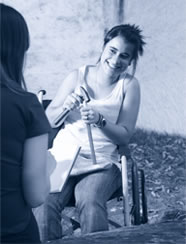Commitment to Consumer Education
Our signature approach to cognitive rehabilitation–functional, cutting edge, and individualized intervention carried out to achieve optimal functioning in the client’s real-world situations–is described in many of the professional publications written by our Clinical Director, Sandy Milton. Publication reprints are available upon request. A partial listing of Sandy’s writings appears below:
- Management of subtle cognitive-communication deficits
- Compensatory memory strategy training: A practical approach for managing persisting memory problems
- Management of persisting communication deficits in patients with traumatic brain injury
- Appraisal of communicative competence in adults following head injury
- Conversational prompting: A sentence building technique for severe aphasia
- Functional evaluation of adolescent students with a traumatic brain injury
- Returning adults with traumatic brain injury to work: How the speech-language pathologist may assist
In addition, we have developed an expanding selection of easy-to-understand educational/resource information sheets related to our two areas of specialization:
- Home and community neurorehabilitation services
- Management of students with language-learning and cognitive-communication-social skills challenges
These materials are part of our ongoing educational commitment to the community we serve. Below you will find a partial listing of available resource handouts provided to clients and their team members:
- Executive functioning and critical thinking skills for school-aged children, adolescents, and adults
- Social (pragmatic) communication skills during social interactions: Our approach to management
- Age-related cognitive decline and primary progressive aphasia/other irreversible, degenerative dementia disorders: How a speech-language pathologist specializing in cognitive rehabilitation may assist
- Cognitive rehabilitation for individuals with gliomas and other brain tumors: How a speech-language pathologist specializing in cognitive therapy may assist
- Chemo brain/cancer therapy-related cognitive decline and the potential benefit of home and community neurorehabilitation services
- The role of a cognitive aide/NeuroAttendantsm assistant in a home and community program
- Driving fitness evaluation following a brain injury or other neurological condition
- Client-program matching: The potential added value of a home and community neurorehabilitation program
- Indirect skill competencies for school success: Organizational skills and time structuring/time management
- Cognitive foundational skills for comprehending inferences and the use of figurative language




